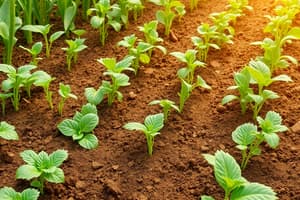Podcast
Questions and Answers
सतत कृषि का महत्व क्या है?
सतत कृषि का महत्व क्या है?
- सभी उपरोक्त (correct)
- आर्थिक संभावनाएँ
- किसानों के समर्थन
- पर्यावरण की देखभाल
सतत कृषि के लिए आर्थिक संभावनाएँ कैसे हैं?
सतत कृषि के लिए आर्थिक संभावनाएँ कैसे हैं?
- सभी उपरोक्त (correct)
- मिट्टी की स्वास्थ्य में सुधार
- पर्यावरण की देखभाल
- कम लागत
सतत कृषि का पर्यावरणीय प्रकोप पर कैसा प्रभाव होता है?
सतत कृषि का पर्यावरणीय प्रकोप पर कैसा प्रभाव होता है?
- समुद्री जीव विविधता का बिगाड़
- मिट्टी में पोषक तत्वों की कमी (correct)
- पेड़-पौधों के संकुचन
- प्राकृतिक संसाधनों की संरक्षा
सतत कृषि के प्रौद्योगिकियों पर किस प्रकार का जोर है?
सतत कृषि के प्रौद्योगिकियों पर किस प्रकार का जोर है?
कौन सा प्रौद्योगिकी किसानों को उनके खेती प्रणाली को संवेदनशील बनाने में मदद करता है?
कौन सा प्रौद्योगिकी किसानों को उनके खेती प्रणाली को संवेदनशील बनाने में मदद करता है?
किस प्रौद्योगिकी में मछली और पौधों की उत्पादन को संयुक्त रूप से किया जाता है?
किस प्रौद्योगिकी में मछली और पौधों की उत्पादन को संयुक्त रूप से किया जाता है?
कौन सा प्रौद्योगिकी GPS, संवेदक, और अन्य साधनों का उपयोग करता है?
कौन सा प्रौद्योगिकी GPS, संवेदक, और अन्य साधनों का उपयोग करता है?
किस प्रौद्योगिकी में संतुलित-पंक्ति प्रणाली का उपयोग होता है?
किस प्रौद्योगिकी में संतुलित-पंक्ति प्रणाली का उपयोग होता है?
किस प्रौद्योगिकी में समुह-प्रक्रिया का प्रमुख प्रसंस्करण है?
किस प्रौद्योगिकी में समुह-प्रक्रिया का प्रमुख प्रसंस्करण है?
Flashcards are hidden until you start studying
Study Notes
Agriculture 12 AgBio: Sustainable Practices and Technologies
Agriculture 12 AgBio is a complex and multifaceted field that encompasses various aspects of agriculture, including sustainable practices and technologies. Sustainable agriculture is a holistic approach to farming that emphasizes the long-term health of the ecosystem, the well-being of local communities, and the preservation of natural resources. This article will explore the importance of sustainable agriculture and highlight some of the key technologies and practices that are driving innovation in the field.
The Importance of Sustainable Agriculture
Sustainable agriculture is crucial for a variety of reasons:
-
Environmental stewardship: Sustainable agriculture practices help to maintain and improve the health of the environment by reducing the use of synthetic fertilizers and pesticides, conserving water and other natural resources, and promoting biodiversity.
-
Social responsibility: Sustainable agriculture supports the well-being of local communities by providing access to fresh, healthy food, fostering economic opportunities, and preserving cultural traditions.
-
Economic viability: Sustainable agriculture can be more profitable in the long term, as it helps to reduce input costs, improve soil health, and build resilience to environmental challenges.
Key Technologies and Practices in Sustainable Agriculture
Several technologies and practices are driving innovation in sustainable agriculture:
-
Precision agriculture: This technology uses GPS, sensors, and other tools to optimize crop management, reduce input costs, and minimize environmental impact.
-
Integrated pest management (IPM): IPM is a sustainable approach to managing pests that emphasizes the use of natural enemies, cultural practices, and other non-chemical methods to control pests.
-
Organic farming: Organic farming is a production method that avoids the use of synthetic fertilizers, pesticides, and other inputs, relying instead on natural inputs and practices to maintain soil health and promote crop growth.
-
Regenerative agriculture: Regenerative agriculture is a holistic approach to farming that focuses on regenerating soil health, sequestering carbon, and enhancing biodiversity.
-
Aquaponics: Aquaponics is a closed-loop system that combines the production of fish and plants, using the waste from the fish to fertilize the plants and the water from the plants to filter the water for the fish.
-
Vertical farming: Vertical farming is a method of growing plants in vertically stacked layers, using artificial light and climate control to optimize growth conditions.
By incorporating these technologies and practices into their farming operations, farmers can improve the sustainability of their practices, reduce their environmental impact, and support the health and well-being of local communities.
Conclusion
Sustainable agriculture is a vital aspect of modern farming, as it helps to promote environmental stewardship, social responsibility, and economic viability. By adopting innovative technologies and practices, such as precision agriculture, IPM, organic farming, regenerative agriculture, aquaponics, and vertical farming, farmers can contribute to a more sustainable and resilient food system. As we continue to face challenges related to climate change, resource scarcity, and population growth, the importance of sustainable agriculture will only continue to grow.
Studying That Suits You
Use AI to generate personalized quizzes and flashcards to suit your learning preferences.




